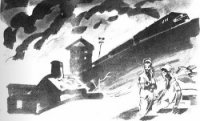Operation Nemesis: The Assassination Plot that Avenged the Armenian Genocide - Bogosian Eric (мир книг .txt) 📗
I found the transcript of Tehlirian’s trial online. It was packed with gruesome details of Soghomon’s ordeal as well as a blow-by-blow description of the assassination. Why wasn’t there a book or a film based on Tehlirian, I wondered. Clearly, the killing of Talat and Tehlirian’s exoneration were tailor-made source material for a motion picture. I could easily imagine the structure of a big film: Act 1: the deportations and massacres in the desert; Act 2: Berlin, the assassination; Act 3: the trial and the triumphant acquittal. A true story filled with pathos and complexity. And history. I had finally found an Armenian subject that would challenge me as a writer and memorialize my beloved grandfather. I decided to set aside a few months to write the screenplay.
As soon as I began to sketch out a draft, obvious questions came to mind. How does an engineering student manage to kill a man who has spent his life surrounded by bodyguards? And with one shot? In the middle of a busy street, in the middle of the day? How did Tehlirian, a man who could barely speak German, get his hands on a gun in postwar Berlin? Was Tehlirian really a student? There was no evidence of his attending classes or having any friends who were students. If he wasn’t a student, what was he doing in Berlin in the first place? How did he support himself? He didn’t seem to have had a job. I read the court transcript over and over again. Something was wrong with this picture.
Then I discovered Resistance and Revenge, a dense monograph published in France in the 1980s by the journalist Jacques Derogy, which explained that in fact, the young Armenian was not an engineering student at all. Nor, as it turns out, had he been a witness to the massacre of his family in the desert. At the time of their deportation he hadn’t even been living in Turkey.
Derogy laid out an even more remarkable, almost unbelievable story: A small group of Armenian conspirators with headquarters in the United States, calling themselves “Operation Nemesis,” had successfully organized the assassination not only of Talat but also of most of the Turkish leaders responsible for the genocide. Neither Peter Balakian nor Samantha Power had made much of the Nemesis conspiracy; neither had mentioned its long list of victims. They focused on Tehlirian and repeated the story he told in court. I needed to know more. Over the next seven years I immersed myself in an exploration of history and of horror, of what the judge at Tehlirian’s trial called “a tradition of bloody vengeance.” I found links to British intelligence, and I reviewed recent research on interference in the trial by German officials. I asked scholar Aram Arkun to translate Tehlirian’s 1953 memoirs, originally published in Armenian, and his work allowed me to deepen my understanding of this complex conspiracy.
These men were contemporaries of my grandfather; some had grown up only a hundred or so miles from where my grandfather was born. But they were nothing like my grandfather. My grandfather could hate Turks, but could he ever have killed one? It is one thing to hate, to wish harm on one’s enemy, but it is a very different thing to step up to someone on the street and put a bullet in his brain. And watch him die.
My grandfather wanted me to know what had happened to him long before I was born. He wanted me to be ready for the worst. He wanted to save me. And so he told me terrible stories and he warned me about the Turks. I’m sure he could never have imagined his young grandson actually killing a Turk, but he had said what he’d said and it never left me. He shared his memory with me, the most valuable thing he owned.
Tehlirian and his cohorts were not simply avengers. They were a small group of men, including a Boston newspaper editor, a Syracuse CPA, and a Washington diplomat, who, through their actions, tried to offset in some way the anonymous deaths of hundreds of thousands of innocent civilians who died in the deserts and in their homes and in mountain wastelands. No headstones mark where those victims of Talat and his gang fell. Nothing is left of them but our memory of them. To the million and a half Armenians who perished at the hands of Ottoman Turks during the First World War, and to their countless descendants, the actions of Operation Nemesis shouted, “You existed. You are memorable. We remember you.”
For almost one hundred years, the story of this controversial band of men has been clouded by myth. I wrote this book because I had no choice. The Nemesis story required more attention than a simple screenplay. I’ve done my best to tell it as honestly and completely as possible. In this way, I honor memory.
PROLOGUE
Around ten o’clock on the morning of March 15, 1921, a heavyset man wearing an overcoat emerged from his apartment house in the fashionable Charlottenburg district of Berlin. He carried a cane and was bareheaded despite the cool early spring weather. The man wasn’t comfortable wearing a European-style hat. It didn’t look right to him. But he wouldn’t dare wear a fez in this anarchic city of spies. The last thing he wanted to do was call attention to his Turkishness. As he stepped onto the sidewalk, the fresh air lifted his spirits. The winter had been long and hard, but a thaw was coming. Soon this exiled Turk could return to his home in Constantinople. His fellow Young Turk, General Mustapha Kemal, was finding success in the east; in months the war would finally be over.
The man in the overcoat, Talat Pasha, had been hiding in Germany under an assumed name, pretending to be a businessman. In the years prior to moving to the apartment on Hardenbergstrasse, Talat had achieved fame as the leader of the Ottoman Empire during the Great War. The name Talat was known to people all over the world, but for the present it was a liability. The British forces occupying Constantinople had arrested numerous Ottoman leaders, the sultan’s government had held war crimes trials, and though he had evaded arrest, Talat had been found guilty and sentenced to death in absentia. For the time being, it would be wiser to go by the more humble “Salih Bey.”
Exile had diminished but not extinguished Talat’s power. He was still a very important man, looked up to by many for leadership. But he had no choice; he had to remain hidden. Only days before, in a secret meeting with the British agent Aubrey Herbert, Talat had been asked if he feared assassination. He had coolly responded, “I never think of it.”1 But he did think of it. He thought of it all the time. There were rumors that the Armenians were hunting for him, that there was a bounty on his head. Talat was accustomed to the fact that his very presence intimidated people, but he also knew that he had to be extremely careful.
What Talat did not know as he strolled down Berlin’s fashionable Hardenbergstrasse on this cool spring morning was that his alias had already been discovered. Danger was much closer than he imagined. Even as he stepped lightly among the local Berliners on his way to the Tiergarten park, he was being followed. Across the street and parallel to his course, a young Armenian emigre from Turkish Anatolia tracked his route. Unlike Talat, Soghomon Tehlirian was almost invisible, figuratively and literally. No one knew his name, no one in Berlin would ever recognize him, and in the midst of this posh neighborhood of White Russian emigres, he did not stand out at all. Tehlirian was the personification of anonymity. In a few moments, that anonymity would end.
Anticipating Talat’s path, the assassin jogged across Hardenbergstrasse, then abruptly turned and strode back toward his quarry. The young Armenian found himself coming face-to-face with the heavyset Turk. His temples throbbing with excitement, Tehlirian focused on his breathing, slowing it, controlling it. This was no time to fall to pieces. Tehlirian searched Talat’s eyes as the two men passed each other. Was there a reaction, a recognition? If there was, it lasted only a fraction of a second. “Fear came into his eyes,” Tehlirian would later write, as an “amazing calmness engulfed my being.”2




